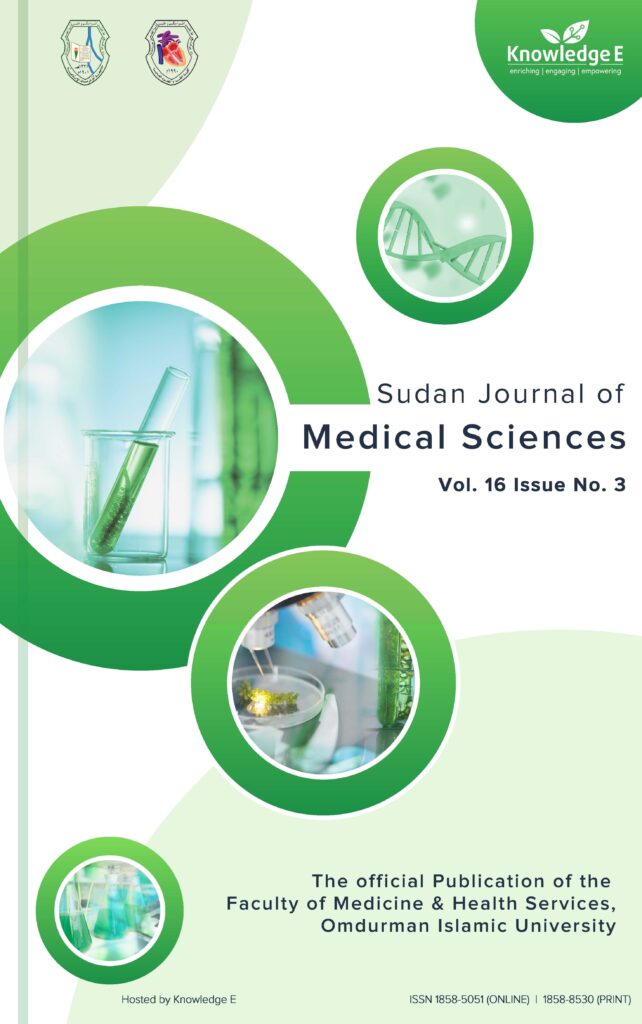
Sudan Journal of Medical Sciences
ISSN: 1858-5051
High-impact research on the latest developments in medicine and healthcare across MENA and Africa
Evaluation of Fine-needle Aspiration Cytology (FNAC) Sensitivity Compared to PCR for Diagnosing Tuberculosis Lymphadenitis
Published date:Sep 30 2022
Journal Title: Sudan Journal of Medical Sciences
Issue title: Sudan JMS: Volume 17 (2022), Issue No. 3
Pages:330 - 340
Authors:
Abstract:
Background: Tuberculosis (TB) is a major healthcare burden in Sudan and other developing countries, it is considered the second most common cause of death from infectious diseases after those due to AIDS. In Sudan, TB lymphadenitis (TBLA) remains one of the major health problems. This descriptive cross-sectional study was conducted at the University of Medical Sciences and Technology (UMST) and Total Labcare Diagnostic Center (TDC). The study aims to compare the sensitivity of Fine Needle Aspiration Cytology (FNAC) smears with that of the Polymerase Chain Reaction (PCR) for the diagnosis of TBLA.
Materials and Methods: Fifty-five dry smears were obtained using fine-needle aspiration (FNA) from an enlarged lymph node. PCR was applied to detect the target gene (IS6110). May-Grunwald-Giemsa (MGG) or Diff quick stains were used.
Results: Two (4%) patients with TBLA were non-necrotic, while fifty-three of them (96%) were necrotic. Moreover, 17 (30%) fine-needle lymph node aspiration specimens were confirmed by PCR to be positive for Mycobacterium tuberculosis complex (MTB complex) while 38 (70%) of them were negative.
Conclusion: There was no significant difference between the sensitivity of PCR and that of FNAC (P-value = 0.33).
Keywords: tuberculosis, lymphadenitis, lymph node, FNAC, PCR
References:
[1] Mittal, P., Handa, U., Mohan, H., & Gupta, V. (2011). Comparative evaluation of fine needle aspiration cytology, culture, and PCR in diagnosis of tuberculous lymphadenitis. Diagnostic Cytopathology, 39, 822–826. https://doi.org/10.1002/dc.21472
[2] Zammarchi, L., Bartalesi, F., & Bartoloni, A. (2014). Tuberculosis in tropical areas and immigrants. Mediterranean Journal of Hematology and Infectious Diseases, 6(1), e2014043. https://doi.org/10.4084/mjhid.2014.043
[3] CDC. (2020). Tuberculosis. CDC. https://www.cdc.gov/globalhealth/newsroom/topics/tb/index.
[4] Chatterjee, D., & Pramanik, A. K. (2015). Tuberculosis in the African continent: A comprehensive review. Pathophysiology, 22(1), 73–83. https://doi.org/10.1016/j.pathophys.2014.12.005
[5] Abdallah, T. M., & Ali, A. A. (2012). Epidemiology of tuberculosis in Eastern Sudan. Asian Pacific Journal of Tropical Biomedicine, 2(12), 999–1001. https://doi.org/10.1016/S2221-1691(13)60013-1
[6] WHO. (2015). Sudan / Tuberculosis. WHO. http://www.emro.who.int/sdn/ programmes/stop-tb-sudan.html
[7] Hwang, S. H., Kim, D. E., Sung, H., Park, B. M., Cho, M. J., Yoon, O. J., & Lee, D. H. (2015). Simple detection of the IS6110 sequence of Mycobacterium tuberculosis complex in sputum, based on PCR with graphene oxide. PLoS One, 10(8), e0136954. https://doi.org/10.1371/journal.pone.0136954
[8] Narayana Reddy, R. A., Narayana, S. M., & Shariff, S. (2013). Role of fine-needle aspiration cytology and fluid cytology in extra-pulmonary tuberculosis. Diagnostic Cytopathology, 41, 392-398. https://doi.org/10.1002/dc.22827
[9] Lazarus, A. A., & Thilagar, B. (2007). Tuberculous lymphadenitis. Disease-a-Month, 53(1), 10–15. https://doi.org/10.1016/j.disamonth.2006.10.001
[10] Mohapatra, P. R., & Janmeja, A. K. (2009). Tuberculous lymphadenitis. The Journal of the Association of Physicians of India, 57, 585–590.
[11] Patwardhan, S. A., Bhargava, P., Bhide, V. M., & Kelkar, D. S. (2011). A study of tubercular lymphadenitis: A comparison of various laboratory diagnostic modalities with a special reference to tubercular polymerase chain reaction. Indian Journal of Medical Microbiology, 29(4), 389–394. https://doi.org/10.4103/0255-0857.90173
[12] Rathod, G. B., & Parmar, P. (2012). Fine needle aspiration cytology of swellings of head and neck region. Indian Journal of Medical Sciences, 66(3–4), 49–54. https://doi.org/10.4103/0019-5359.110896
[13] Wakely, P. E., Jr., & Cibas, E. S. (2009). Chapter 11 - Lymph nodes. In: E. S. Cibas & B. S. Ducatman (Eds.). Cytology (3rd ed.). (319–357). Science Direct. https://doi.org/10.1016/B978-1-4160-5329-3.00011-6
[14] Caetano-Anolles, D. (2013). Polymerase chain reaction. In: S. Maloy & K. Hughes (Eds.). Brenner’s encyclopedia of genetics brenner’s encyclopedia of genetics (2nd ed.). (392–395). Academic Press. https://doi.org/10.1016/B978-0-12-374984-0.01186-4
[15] Hwang, S. H., Kim, D. E., Sung, H., Park, B. M., Cho, M. J., Yoon, O. J., & Lee, D. H. (2015). Simple detection of the IS6110 sequence of Mycobacterium tuberculosis complex in sputum, based on PCR with graphene oxide. PLoS One, 10(8), e0136954. https://doi.org/10.1371/journal.pone.0136954
[16] Lorenz, T. C. (2012). Polymerase chain reaction: Basic protocol plus troubleshooting and optimization strategies. Journal of Visualized Experiments, e3998(63), e3998. https://doi.org/10.3791/3998
[17] Chantranuwat, C., Assanasen, T., Shuangshoti, S., & Sampatanukul, P. (2006). Polymerase chain reaction for detection of Mycobacterium tuberculosis in papanicolaou-stained fine needle aspirated smears for diagnosis of cervical tuberculous lymphadenitis. The Southeast Asian Journal of Tropical Medicine and Public Health, 37(5), 940–947.
[18] Tansuphasiri, U., Boonrat, P., & Rienthong, S. (2004). Direct identification of Mycobacterium tuberculosis from sputum on Ziehl-Neelsen acid fast stained slides by use of silica-based filter combined with polymerase chain reaction assay. Journal of the Medical Association of Thailand, 87(2), 180–189.